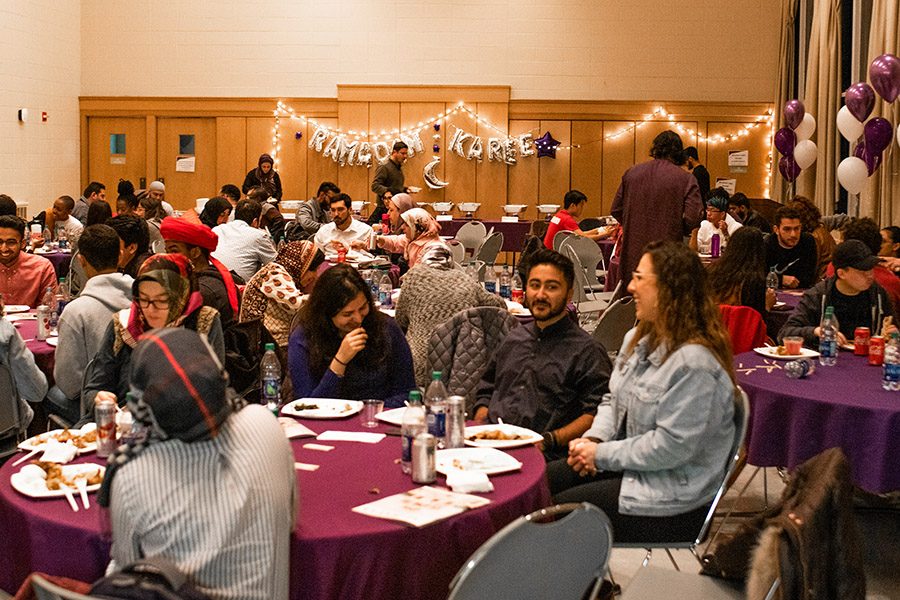Muslims, non-Muslims break fast during community iftar
Evan Robinson-Johnson/Daily Senior Staffer
Northwestern community members celebrate the first day of Ramadan Monday evening. More than 150 people gathered in Parkes Hall to break their fast together.
May 7, 2019
More than 150 people gathered in Parkes Hall Monday to celebrate the first day of Ramadan and break fast together during the Muslim-cultural Students Association’s annual community iftar. The event was open to all community members, regardless of their religious beliefs.
Ramadan is the ninth month in the Muslim lunar calendar and started May 6 this year. During the holy month, Muslims who are able fast from sunrise to sunset to show solidarity with the less fortunate, practice patience and grow closer to God.
During the iftar, or the breaking of the fast at sunset, community members ate dates after a group prayer outside while recognizing both Sunni and Shia Ramadan traditions. The event was catered by Chicago restaurant Usmania Fine Dining.
Huma Manjra, McSA’s Associated Student Government senator, organized much of the event and said it was a good experience. The Weinberg freshman said one of her focuses while planning was making the reservations more efficient to ensure the right amount of food was bought. She also wanted to make the decorations good — the room was filled with purple and white balloons, string lights and a “Ramadan Kareem” sign wishing everyone a generous holy month.
Manjra said she wanted to make the space feel like home and ensure attendees felt “the Ramadan spirit” as soon as they walked into the room.
The timing of this Ramadan made Manjra nervous because it’s one of the biggest holidays in Islam, and she usually celebrates with her family at home in California. Ramadan typically falls in the summer, so she said many Muslims on campus are celebrating the whole month away from family for the first time.
“It really gives me the big picture when I look around and I see I still have a different family — these people are my home away from home,” Manjra said. “It’ll be different, but different doesn’t mean it’s not going to be as enjoyable or memorable, so I’m hoping and I’m praying that this Ramadan will feel just as any other if not better.”
McSA secretary Fizzah Jaffer echoed those sentiments — this is her first Ramadan away from home, but her friends here feel also like family. She said the community iftar is an important chance for people to see the strength and spirituality of the NU Muslim community.
Weinberg senior Jaafar Zaidi said he has noticed the community come together around the month of Ramadan. He said it’s easy to have solidarity with other students who are also fasting during the day, and noted that McSA does a good job of making sure Muslims can eat after sunset, with access to dining halls during extended times.
“During Ramadan itself, we get a lot closer, just because you see these people every day in the evening and you’re all talking about the same thing — food, basically,” Zaidi said. “There’s the spiritual aspect too, because you all pray together and you’re guaranteed to see everyone every day.”
He said growing up, he was used to relying on his mosque community because there weren’t many Muslims in his hometown. At Northwestern, he’s found a strong Muslim community, and said he appreciates seeing non-Muslims at the iftar as well, and how they are brought into something the community does.
Danielle Addo is not Muslim but came to the iftar to support one of her friends who helped out with the event. The sophomore said she noticed the strong, inclusive community presence.
“It’s a yearly thing and just having the strength within yourself (to fast), it’s really inspirational to see that,” Addo said. “If Muslims can fast, there’s pretty much not a limit to anything I can do.”
Email: [email protected]
Twitter: @mar1ssamart1nez
Related Stories:
– Former Michigan gubernatorial candidate said his faith taught him to be good
– In God We Trust?: Despite national polarization, Islam remains inspiration for activism


